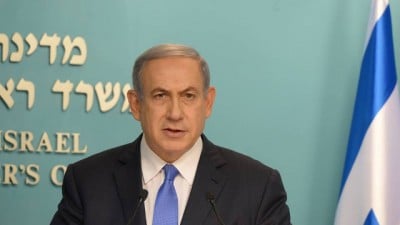Netanyahu Paves the Way for a New Era Of Tyranny

With dismaying predictability, Israeli prime minister Benjamin Netanyahu lost no time in exploiting the massacre in Paris. As he has done many times before, he claimed Europe’s trauma was just a taste of the suffering Israelis have long known.
Discounting decades of a brutal Israeli occupation as the cause of the recent wave of Palestinian attacks, he said: “It is the terrorists who are to blame for terrorism, not the territories, not the settlements and not any other thing.”
Rather than criticising the occupation, he added, the world should learn from Israel’s “aggressive policy” how to defeat its enemies. Last week, he unveiled the latest measure, outlawing the northern wing of the Islamic Movement, a popular party among Israel’s Palestinian citizens, one in five of the population.
Netanyahu and his ministers justified the decision by conflating the Islamic Movement with Hamas and ISIL. But while its leader, Sheikh Raed Salah, rejects the idea of a Jewish state, the movement operates entirely within Israeli law. Israel’s Shin Bet intelligence agency opposed Netanyahu’s move, admitting that it had failed to find any evidence linking the movement to violence.
Salah’s organisation refuses to participate in the Israeli parliament, and instead directs much of its efforts at religious instruction and good works, including health clinics, nurseries and sports clubs, to the poorest communities in Israel.
That has made it hugely popular. A recent survey found 57 per cent of Israel’s 1.6 million Palestinian citizens believe the movement represents them. A third of Israel’s Palestinian Christians support it too. And it has 10,000 paid-up members, who now risk imprisonment.
So why do it? There are several benefits for Netanyahu and the Israeli right in equating all Islamic activism with terrorism.
Not least, international pressure to negotiate an end to the occupation is likely to lift. He can now recast Israel’s conflict with the Palestinians from a national conflict into a religious – and existential – one. If France is getting tough against ISIL, why should Netanyahu be expected to sit down with his own extremists?
It also helps him domestically. He needs an implacable foe to justify to Israelis why they need an authoritarian government like his.
The US nuclear deal with Iran removed his chief bogeyman. Meanwhile, Mahmoud Abbas’s Palestinian Authority is helping maintain order in the West Bank. And Hamas is licking its wounds in Gaza. Now he has an internal enemy, the Islamic Movement, that the argument goes must be fought ruthlessly from within.
Salah’s group fits the bill well. It has been an obstacle to two key planks of the Israeli right’s agenda.
First, it has frustrated the government’s efforts to drive tens of thousands of Bedouin from their ancestral villages into hugely deprived townships. The Islamic Movement has helped to organise and strengthen these communities.
And second, Salah has taken on the fight at Al Aqsa mosque in Jerusalem, as Jewish settler groups have used their government connections to gain ever greater purchase on the holy esplanade.
Salah’s cry of “Al Aqsa is in danger” has rallied huge numbers of supporters – Palestinians with the advantage of Israeli citizenship – to get involved at the mosque, at a time when all other Palestinian players, including the PA, have been excluded from Jerusalem.
Netanyahu characterises that opposition to his Jerusalem policies as a terror-like “incitement”, saying it has triggered the current Palestinian unrest.
Outlawing the Islamic Movement looks set to be the first step down a path to greater political repression.
Last year the Netanyahu government passed a law raising the electoral threshold too high for any of Israel’s Palestinian political parties to pass it and so win seats in the parliament.
Against the odds, the disparate factions created a Joint List, which is now the third largest party in the chamber. In response, Netanyahu used the election campaign to fearmonger, warning that Palestinian citizens were coming out to vote “in droves”.
The crackdown on the Islamic Movement paves the way to justifying a ban on members of the Joint List. The Balad faction, in particular, has skated close to illegality by arguing that Israel cannot be both Jewish and democratic.
Its demand that Israel choose democracy – becoming a “state of all its citizens” – has outraged the right and led to repeated efforts to ban it. That now seems likelier than ever.
If Balad is outlawed too, the Joint List will collapse and the Palestinian parties will be forced out of the Israeli political arena.
The Shin Bet opposed outlawing Salah’s movement because it feared the move would radicalise the Palestinian minority. Denied either a parliamentary or extra-parliamentary platform, some would drift towards violence.
That is already a danger. Last week six Palestinian citizens were charged with trying to join ISIL in Syria, so far a tiny but discernible trend.
Netanyahu’s world view has always depended on a bloody, winner-takes-all clash of civilisations between West and East. He will continue offering vociferous advice on tackling terrorism to European leaders. They would do well to ignore him.

